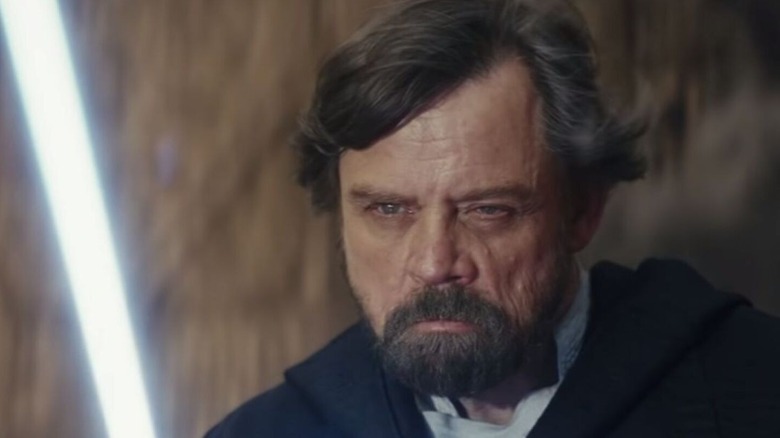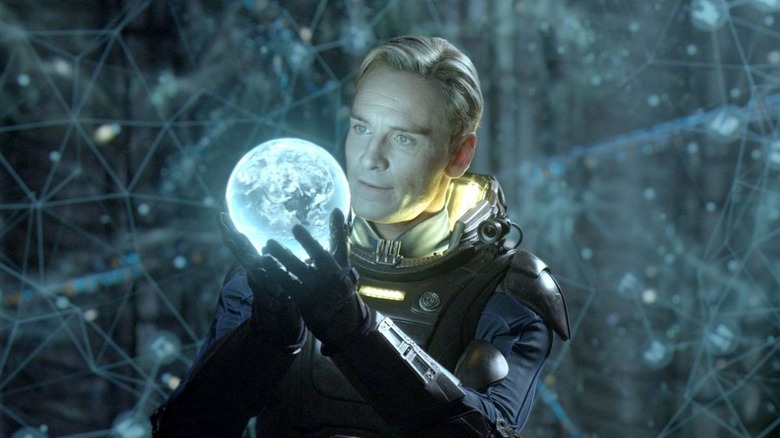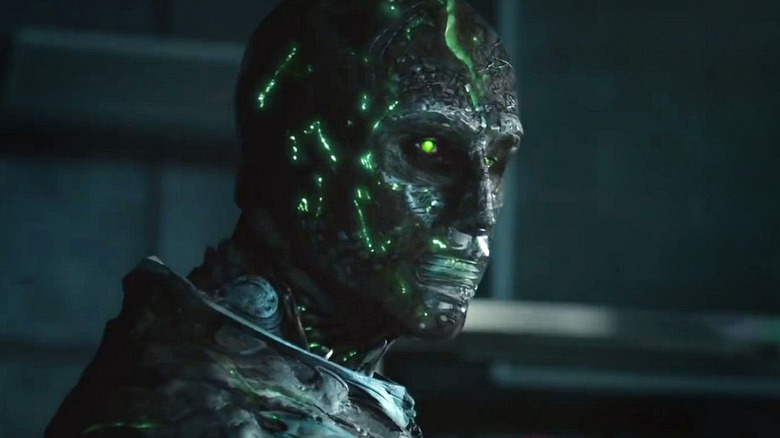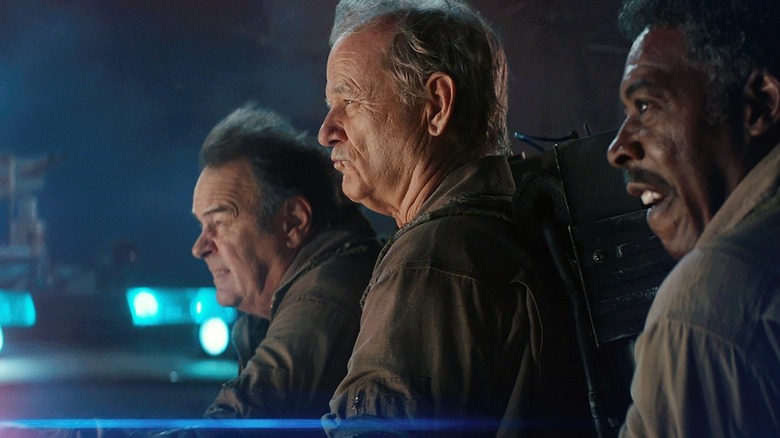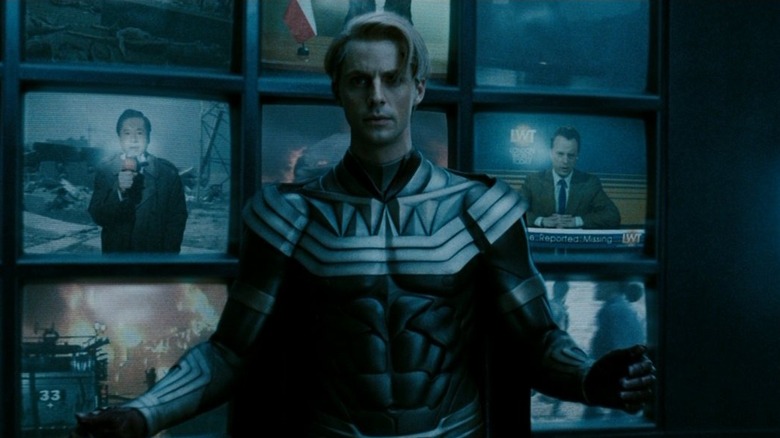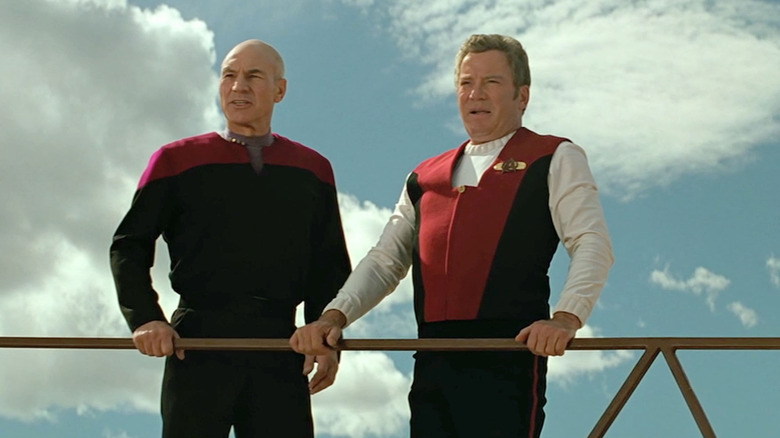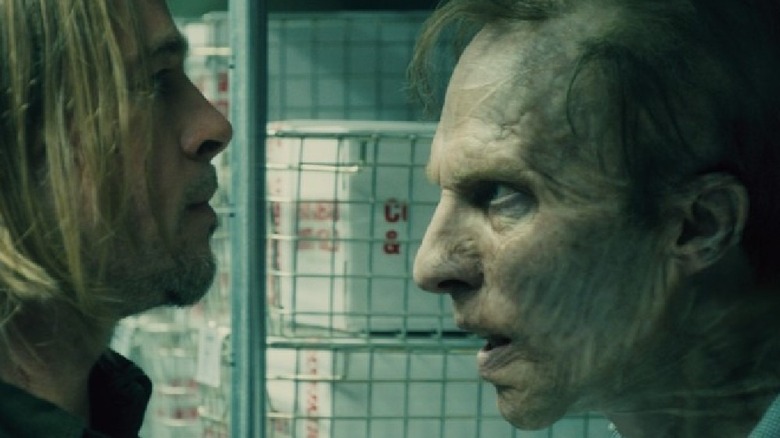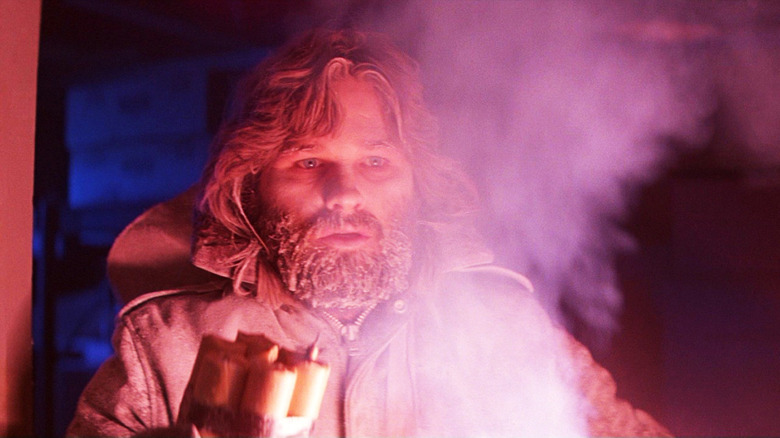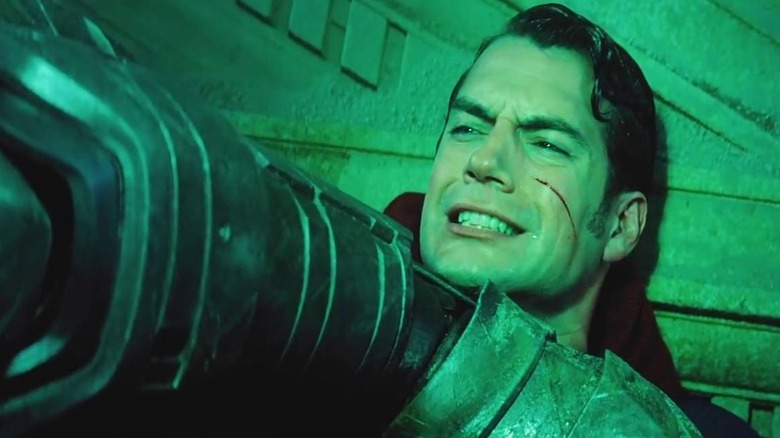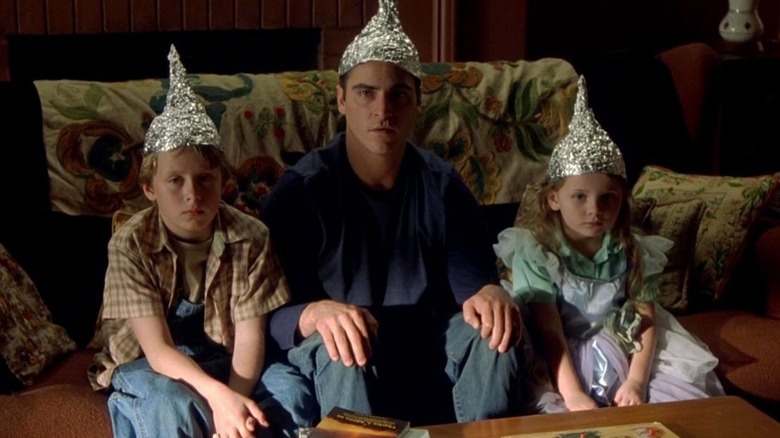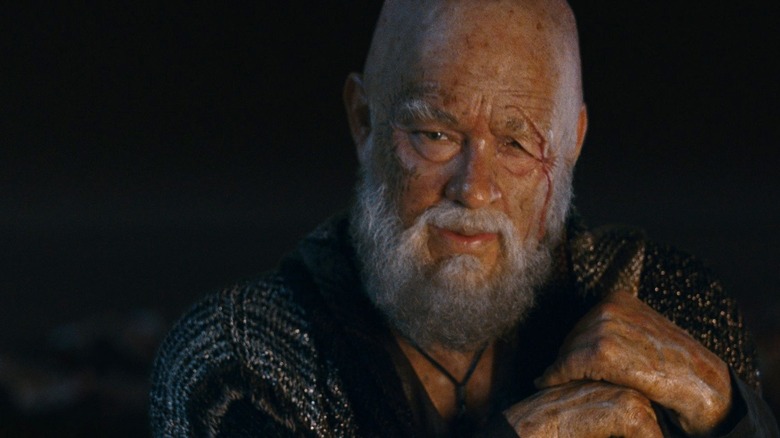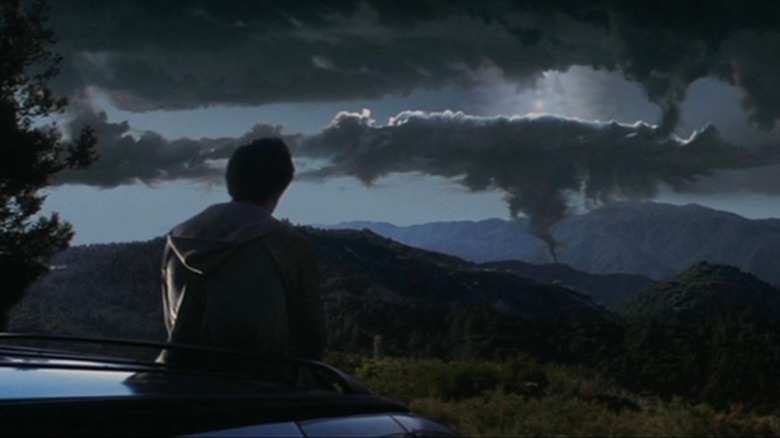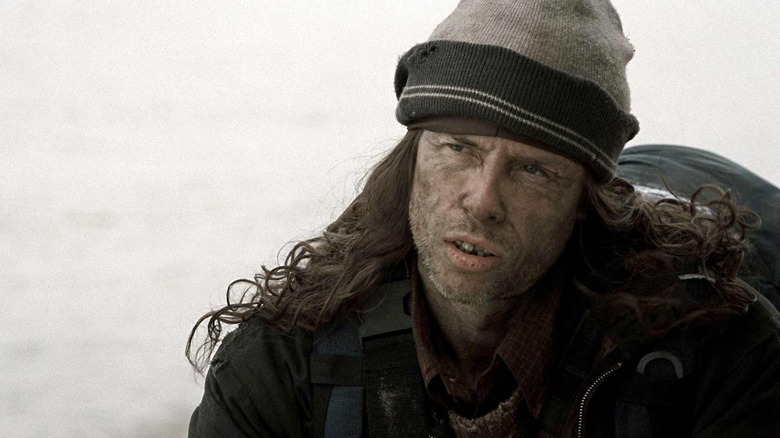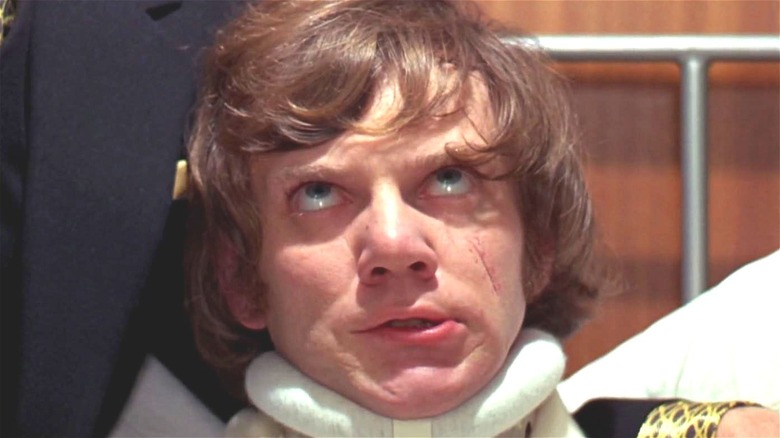The Most Controversial Sci-Fi Movie Endings Of All Time
It would be pretty boring if science fiction movie fans simply agreed about everything. Having a good discussion about why you disagree about a film's ending can open you up to a different point of view, as someone else may have picked up on something you completely missed. In the internet era, there are more opportunities than ever before to connect with your fellow movie lovers, with film networking sites like Letterboxd offering fans the chance to share their opinions and have thoughtful, productive debates.
A science fiction film's ending is often the "make or break" point: after learning about the film's story and characters, fans want to feel like their investment has paid off. Sometimes, a surprising ending can catch the audience off guard, but not every film fan responds favorably to a last-minute plot twist. The following films have split audiences down the middle, so here are some of the most controversial sci-fi movie endings of all time.
(As if the title wasn't enough of a tipoff, BEWARE OF SPOILERS!!!)
Star Wars: The Last Jedi (2017)
After the release of "Star Wars: The Force Awakens" in 2015, there were many popular theories floating around the Internet about Rey's (Daisy Ridley) heritage. A brief dream sequence in "The Force Awakens" seemingly suggested that Rey's family is much more important than she initially realized. Some fans speculated that she could be Luke Skywalker's daughter, making her the cousin of Kylo Ren (Adam Driver). In 2017's "Star Wars: The Last Jedi," Kylo Ren torments Rey by discussing her family history. He reveals a twist that nobody saw coming: Rey isn't descended from any established bloodline. Her parents were simply junk traders who abandoned her at a young age. There's nothing inherently important about Rey, she earned her role in the galactic conflict through merit alone. This divided "Star Wars" fans.
Some viewers felt that the revelation was brilliant, since "Star Wars" has always been about the power of personal choice, and the freedom to create your own destiny. However, fans who had invested in their personal fan theories may have been disappointed by the different direction that writer/director Rian Johnson chose to take the story. The ending of "The Last Jedi" is brilliant, and it would be pretty boring if every new "Star Wars" character was connected to an established bloodline. It would make the universe feel even smaller. Unfortunately, this choice was retconned in "Star Wars: The Rise of Skywalker," which reveals that Rey is the granddaughter of Emperor Palpatine (Ian McDiarmid).
Prometheus (2012)
There was a lot of speculation among science fiction fans about Ridley Scott's 2012 film "Prometheus" before it was released. It was unclear how closely the prequel would be tied to the "Alien" universe that Scott had first created in 1979. Up until the ending, "Prometheus" is essentially a standalone sci-fi story with nods to the "Alien" universe, a more philosophical space opera than any of the previous films in the franchise. "Prometheus" explores the search for a creator, with the wealthy CEO Peter Weyland (Guy Pearce) funding a mission to find a group of aliens known as "the Engineers," who are seemingly responsible for creating mankind. Over the course of their mission, the archaeologists Elizabeth Shaw (Noomi Rapace) and Charlie Holloway (Logan Marshall-Green) bond with the android David (Michael Fassbender).
David also begins to question his purpose and begins experimenting with biological liquids, resulting in devastating consequences. The Engineers ultimately reject and kill Weyland, with one of them fleeing the mysterious planet in a spacecraft. Shaw and David must stop the Engineer from bringing toxic liquids to Earth. They are ultimately successful, but the film ends on an ambiguous note briefly teasing a connection between the Engineers and the Xenomorph creatures from "Alien." This divided the fan base, as some felt that the story was inconclusive. Scott admitted that "Prometheus" would have been more popular among fans if the connections to the "Alien" universe were more clear from the beginning.
Fantastic Four (2015)
The 2015 comic book film "Fant4stic" had one of the most challenging production cycles in recent memory. 20th Century Fox hired "Chronicle" director Josh Trank to helm a reboot of Marvel's first family. Trank wanted to radically reimagine the story and turn it into a science fiction body horror film in the style of David Cronenberg. This was met with backlash from Fox, and months before the film was released extensive reshoots were done to change the film's tone and rework the ending.
The final act of "Fant4stic" features a tacked-on action sequence, which feels like it was taken out of a completely different movie. The troubled computer technician Victor Von Doom (Toby Kebbell) embraces his moniker "Doom" and begins wreaking havoc and destruction. Reed Richards (Miles Teller), Susan Storm (Kate Mara), Johnny Storm (Michael B. Jordan), and Ben Grimm (Jamie Bell) are forced to team up to stop Doom. This feels like a more traditional comic book movie ending inserted into an experimental horror film. "Fant4stic" reviews largely panned the film, but fans and critics were divided on why the film was so bad. Trank's original concept for the film might not have worked, but it may have been more interesting to see his completed story than to watch a studio-mandated action sequence. Even if Trank's vision was flawed, it was at least a unique interpretation.
Ghostbusters: Afterlife (2021)
Nostalgia is a double-edged sword. There's a value in honoring what came before, but simply coasting on nostalgia is not enough to justify a film's existence. We've seen science fiction films in recent years that have both benefited and suffered from heavily playing on fans' nostalgia for established properties.
"Ghostbusters: Afterlife" divided "Ghostbusters" fans over how it concluded. Up until the ending, "Ghostbusters: Afterlife" was a very unique entry in the franchise. Unlike the previous installments, which had all taken place in New York City, "Afterlife" was set within a rural city. It followed a group of younger characters, which made the series feel fresh again. During the final scene, the original Ghostbusters Dr. Peter Venkman (Bill Murray), Dr. Ray Stantz (Dan Akroyd), and Winston Zeddemore (Ernie Hudson) show up to help Phoebe Spengler (Mckenna Grace). Phoebe is guided by the ghost of her grandfather, Egon (Harold Ramis). Ramis' mannerisms were brought back using CGI effects, which some fans felt was trying too hard to play on nostalgic feelings. However, the rest of "Afterlife" is so unique that the more familiar direction of the conclusion did not feel like an excuse for poor storytelling.
Watchmen (2009)
Alan Moore's classic graphic novel "Watchmen" is one of the most celebrated works of literature in the history of superhero stories. The controversial director Zack Snyder adapted "Watchmen" into a feature film in 2009, and fans were divided over their opinions. Snyder's adaptation is incredibly faithful to the original source material, and there are many moments and lines taken directly from the pages of the graphic novel. However, Snyder made a major change to the story's conclusion: In the original story, the villain Ozymandias (Matthew Goode) unleashes a squid monster on New York City, devastating the city's population. In the film, Dr. Manhattan (Billy Crudup) is blamed for the attack. This change was shocking for fans, considering how similar the two stories had been up until that point.
Within the context of the film, making Dr. Manhattan the scapegoat for the attack made sense. "Watchmen" was already a very long movie, and taking more time to introduce the squid storyline would have only made the story feel bloated. Snyder's ending also ties into Dr. Manhattan's decision to leave Earth and live on Mars.
Star Trek: Generations (1994)
Any time that a major franchise kills off an iconic character, it is bound to be controversial. There is nothing worse than a shocking moment that feels like it's only there to gut punch the viewer. The "Star Trek" franchise is no stranger to killing off an iconic hero in a controversial way, as Spock famously sacrifices himself at the end of 1982's "Star Trek II: The Wrath of Khan."
"Star Trek: Generations" was the first film to feature the cast of the "Star Trek: The Next Generation" television series. Captain Jean-Luc Picard (Patrick Stewart) teams up with Captain James T. Kirk (William Shatner) to battle the evil scientist Dr. Soran (Malcolm McDowell). During the skirmish, Kirk is shockingly killed, and some fans were outraged that the iconic "Enterprise" captain met his fate in such a brutal way. While Spock's death in "The Wrath of Khan" was justified, killing off Kirk was a distracting story choice. "Generations" is really Picard's story, and all the attention paid to Kirk didn't allow Picard to forge his own destiny. It was also strange for Kirk to play such a major role in the film, as he was already given a satisfying conclusion in the previous film, 1991's "Star Trek VI: The Undiscovered Country."
World War Z (2013)
It is kind of a miracle that the 2013 zombie thriller "World War Z" turned out to be as good as it was, especially since the film had a notoriously troubled production. Based on Max Brooks' critically acclaimed novel, "World War Z" explores the collapse of the world's political infrastructure in the wake of a zombie pandemic. The former United Nations agent Gerry Lane (Brad Pitt) is called back into duty to investigate the origins of the outbreak.
One of the reasons that "World War Z" had such a challenging production cycle was that multiple versions of the script that were being considered. During a series of reshoots, screenwriter Drew Goddard was brought in to come up with a completely different ending sequence where Gerry discovers that exposing himself to a dangerous pathogen will allow him to hide from the undead, leading scientists to begin developing a vaccine to fight the infection. While this may have felt like a change of pace, the more restrained climactic sequence actually works in the film's favor. After many epic combat sequences, it was interesting to see Gerry using science to outwit the zombies. A more traditional action sequence wouldn't have been as unique.
The Thing (1982)
While it is now considered to be one of the greatest science fiction films of all time, John Carpenter's 1982 film "The Thing" was initially a box office disaster. "The Thing" was a much different film from what audiences had expected, even though it was based on the 1951 monster movie "The Thing from Another World." Carpenter's remake is dark, disturbing, and devoid of hope, and the ending closes the film on a solemn note.
After escaping from the bunker, R.J. MacReady (Kurt Russell) and Childs (Keith David) take a moment to contemplate their fate, as it's possible that either of them is now the monster. Originally, Carpenter had intended to confirm that MacReady was a human, but the sequence he shot was cut. While this ending may have been deemed too bleak during the film's initial release, anything more hopeful would have clashed with the darker tone that Carpenter had already established.
Inception (2010)
Film fans have been debating the ending of "Inception" for over a decade. Christopher Nolan's science fiction heist film is one of the most complex original blockbusters in recent memory, one that made audiences desperate to decipher its closing shot. The dream thief Cobb (Leonardo DiCaprio) has been waiting to see his children for the entire film, and he chooses to greet them instead of determining whether or not he is still dreaming.
This ending provoked many thoughtful fan theories, but it also prompted some backlash from fans who felt the ending was a cop-out. Despite the ambiguous nature of Cobb's reality, his character arc receives a satisfying conclusion. Cobb has accepted the world that he is living in and whether it is real or still a dream is a question that may never be answered. There's a beauty in not knowing, and Nolan has yet to develop a sequel that could offer an explanation.
Batman v Superman: Dawn of Justice (2016)
Zack Snyder's 2016 film "Batman v Superman: Dawn of Justice" is one of the most divisive comic book films of all time. While a passionate group of defenders claims it is a masterpiece, others see it as the embodiment of everything wrong with modern blockbusters. Similar to "Man of Steel," "Batman v Superman" is packed with biblical metaphors, with Snyder reimagining Superman as a messianic figure ... which meant he had to be killed off and then resurrected.
Snyder has defended the controversial ending as the "inevitable" conclusion to the story. Unfortunately, "Batman v Superman" did not get the audience invested in Superman (Henry Cavill) before his death. Superman never truly becomes the "symbol of hope," and although his death was clearly inspired by the "Death of Superman" comic book storyline, that series came after readers had already gotten ample time to learn about the Man of Steel. Fans were not able to connect with Cavill's version of the character in the same way.
Signs (2002)
Filmmaker M. Night Shyamalan is renowned for his shocking plot twists, drawing both criticism and praise for the ways that he misdirects the audience. When looking at Shyamalan's filmography, it is easy to recognize both his successes and failures. Films like "The Sixth Sense" and "Unbreakable" conclude with satisfying twists, but films like "Lady in the Water" or "The Happening" fall completely flat with their last-minute revelations. However, Shyamalan's fans are divided on the final twist in 2002's "Signs."
In the climactic finale of the film, it is revealed that the alien visitors to Earth have a secret weakness toward water. Some fans interpreted this as a plot hole, wondering why aliens would travel to a planet that is covered in oceans? However, Shyamalan indicates that the aliens are simply on an exploratory mission, and have yet to learn very much about Earth. The conclusion of "Signs" is satisfying on an emotional level, as Graham Hess (Mel Gibson) is able to reconnect with his children Morgan (Rory Culkin) and Bo (Abigail Breslin) after they survive the alien encounter.
Cloud Atlas (2012)
"Cloud Atlas" is one of the most complex movies of the 21st century, an adaptation of David Mitchell's novel which was deemed unfilmable. "Cloud Atlas" takes place across six intersecting timelines throughout the course of human history, with directors Tom Tykwer and the Wachowski sisters drawing parallels between the South Chatham islands in 1849, England in 1936, San Francisco in 1973, London in 2012, a dystopian Seoul in 2144, and the aftermath of an apocalyptic event in 2321.
It can be very challenging to keep track of the different ongoing storylines. The final scene, which takes place in 2321, was seen by many viewers as confusing. After relocating to a different planet, the wise man Zachry (Tom Hanks) recounts everything that he has learned to his grandchildren. Some found this to be touching, while others saw it as melodramatic. It's effective to end the film in this intimate moment since it embodies the theme of "Cloud Atlas" that love is more powerful than time.
Donnie Darko (2001)
"Donnie Darko" baffled audiences when it was initially released. Richard Kelly's 2001 time travel film tells the coming-of-age story of teenage loner Donnie (Jake Gyllenhaal). Donnie receives mysterious visions of a man in a bunny rabbit suit, known only as "Frank," who says that the world will end in 28 days, 6 hours, 42 minutes, and 12 seconds. Donnie orchestrates events that save his mother (Mary McDonnell) and sister Samantha (Daveigh Chase) from death. He also exposes a secret stash of child pornography held by the inspirational speaker Jim Cunningham (Patrick Swayze).
Donnie chooses to sacrifice himself in the end, and it was a satisfying wrap-up to his character arc since no one will know about Donnie's selfless act, but he changes his community for the better. The initial theatrical cut confused viewers because it wasn't clear how Donnie's fate fit within the Tangent Universe. However, Kelly's 2003 director's cut made the complex mythology easier to understand.
The Road (2009)
Director John Hillcoat's 2009 dark futuristic drama "The Road" struck many viewers as too bleak. Set in the aftermath of a worldwide crisis event, it's one of the bleakest post-apocalyptic films ever made. The film chronicles the exploits of a scavenger (Viggo Mortensen) and his young son (Kodi Smit-McPhee). While many praised the film for its realism, "The Road" was also criticized as hopeless by some critics. However, director John Hillcoat was only honoring the spirit of the Cormac McCarthy novel that inspired the film.
Hillcoat allows the viewer to interpret the ending as either tragic or uplifting. After his father dies, Smit-McPhee's character meets a mysterious stranger (Guy Pearce), who offers to adopt him as part of his family. It is unclear whether or not Pearce's character is trustworthy, but the stranger convinces the boy that he is one of the "good guys." Is he sincere, or being deceitful? "The Road" is powerful because of its ambiguity.
A Clockwork Orange (1971)
"A Clockwork Orange" was already a very controversial film before viewers saw its ending. Preceding the creation of the NC-17, "A Clockwork Orange" was one of the few mainstream films that landed an "X" rating. The dystopian film's graphic violent and sexual content caused it to be banned in many countries. Director Stanley Kubrick even received death threats, as some audiences felt that he was "glorifying" the film's protagonist, Alex DeLarge (Malcolm McDowell).
However, it's clear from the final scene that Kubrick had a powerful message that he was trying to relay. Alex is a violent sociopath and undergoes psychiatric treatment to "cure" his behavior. Kubrick criticizes the failures of the government to curb juvenile delinquency and shows that even though the psychiatrist may have conditioned Alex not to act violently, he still has the same demented fantasies. Therapy didn't really "cure" Alex, and the government doesn't actually have a solution to stop the cycle of violence.

